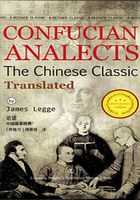
CHAPTER 13
1. Wang-sun Kea asked, saying, "What is the meaning of the saying, 'It is better to pay court to the furnace than to the south-west corner?'"
2. The Master said, "Not so. He who offends against Heaven has none to whom he can pray."
12. CONFUCIUS' OWN SINCERITY IN SACRIFICING. 1. 祭 here is historical and not to be translated in the imperative. We have to supply an object. to the first 祭, viz. 先祖, the dead, his forefathers, as contrasted with 神 in the next clause,= all the 'spirits' to which in his official capacity he would have to sacrifice. 2. Obs. 与 in low 3d tone, 'to be present at', 'to take part in'.
13. THAT THERE IS NO RESOURCE AGAINST THE CONSEQUENCES OF VLOLATING THE RIGHT. 1. Kea was a great officer of Wei(卫), and having the power of the state in his hands insinuated to Confucius that it would be for his advantage to pay court to him. The 奥, or south west corner, was from the structure of ancient houses the cosiest nook, and the place of honour. Choo He explains the proverb by reference to the customs of sacrifice. The furnace was comparatively a mean place, but when the spirit of the furnace was sacrificed to, then the rank of the two places was changed for the time, and the proverb quoted was in vogue. But there does not seem much force in this explanation. The door, or well, or any other of the five things in the regular sacrifices, might take the place of the furnace. The old explanation which makes no reference to sacrifice is simpler. 奥might be the more retired and honourable place, but the 灶 was the more important for the support and comfort of the household. The prince and his immediate attendants might be more honourable than such a minister as Kea, but more benefit might be got from him. 媚, from woman and eyebrows,= 'to ogle', 'to flatter'. 2. Confucius' reply was in a high tone. Choo He says, 天即理也, 'Heaven means principle'. But why should Heaven mean principle, if there were not in such a use of the term an instinctive recognition of a supreme government of intelligence and righteousness? We find 天 explained in the 摭余说by 高高在上者, 'The lofty one who is on high'.
